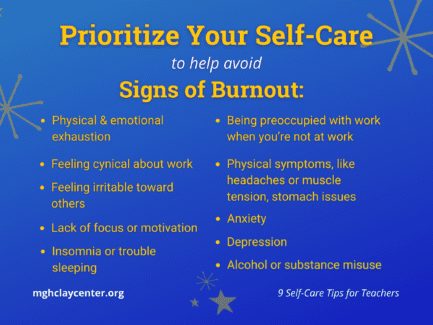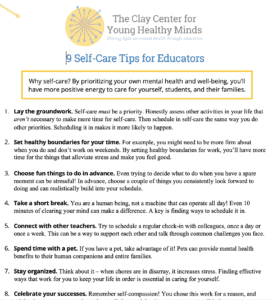9 Self-Care Tips for Teachers

Posted in: Stress, You & Your Family
Topics: Healthy Living, Stress
Since COVID-19, teachers have continued to feel additional pressures on top of their already demanding work lives:
- Being responsible for teaching and emotionally supporting students
- Responding to increased parent communications, through multiple online platforms
- Creating innovative ways to interact remotely, and navigating the technology to do it
- Being prepared to offer hybrid meetings and events (both in-person and remote) to parents and others
These new job requirements take increased time and energy, and can add stress – even more than two years since the pandemic began. Self-care is necessary for relieving stress and maintaining mental and emotional health.
As we say to parents all the time, you have to put on your own oxygen mask first to best support your kids and teens. The same is true for teachers – by taking care of your own mental health and well-being, you’ll have more positive energy for yourself, and for your students and their families.
With competing priorities and never-ending to do lists, self-care may not feel like a choice, but it is! It can take hard work to make it part of one’s daily life. Below are some suggestions to help you build self-care into your regular routine.
The 2020 Teachers of the Year share how they practice self-care (Google for Education):
1. Lay the Groundwork for Self-Care
Self-care looks different for everyone, so a good place to start in incorporating it into your routine is to answer a few foundational questions. See a sample list of questions here.
 These are questions that only you can answer. Questions like, “How burnt out am I?” or “Am I trying to keep too many balls in the air?” These can help you to figure out what’s causing stress in your life, how you respond to stress, and what changes are needed to make you feel better.
These are questions that only you can answer. Questions like, “How burnt out am I?” or “Am I trying to keep too many balls in the air?” These can help you to figure out what’s causing stress in your life, how you respond to stress, and what changes are needed to make you feel better.
Once you have a sense of your biggest stressors and what things might help you support your emotional health, take steps to make sure you have time to practice self-care.
- Prioritize self-care. Self-care should be on your mental “to do” list the same as other things in your life. You can’t do everything, but self-care is a must, so be honest with yourself about things that aren’t absolutely necessary, and move them lower on your list to make room for self-care. Sometimes you’ll need to say “No” to a colleague who asks for extra help. Do you really need to watch that “tips for online teaching” video, or are you managing well enough already? Maybe you need to take a step back from your volunteer time, this year.
- Schedule time for self-care. Once it’s a priority, you can find a place for it in your school-day or personal schedule. Not only will you be more likely to do it if it’s part of a concrete schedule, you might look forward to it because you’ll be able to anticipate when it’s going to happen.
More on laying the groundwork for self-care from Mindful Teachers and this video by Erica Bronkhorst.
2. Set Healthy Boundaries for Your Time
You know better than anyone that a teacher’s job leads to working unconventional hours – evenings and weekends – in order to prepare lesson plans, grade schoolwork, catch up on e-mail, and more. Even before the pandemic, many dedicated teachers let work spill over into their personal lives at unhealthy levels. Now, amid COVID-19, the lines between professional and personal life feel even more blurred.
More important than ever is to set healthy boundaries for yourself, and stick to them. Just as you might schedule time for self-care, schedule time to be “off the clock.” For example, you might need to be firm on “office hours” you set for students or parents, to protect your time. Remind yourself, you are just one person – you cannot control everything, and education is a collective effort. Remind yourself, too, to take time off when you feel overwhelmed, and know that you are doing good for both yourself and your students when you do.
By setting healthy boundaries for work, you’ll have more time for the things that alleviate stress and make you feel good, whether these are specific activities, or just more time to spend with your own family or friends.
Read more on strategies for setting healthy boundaries from the National Education Association and Understood.
3. Choose Fun Things to Do in Advance
Most of us have a variety of things we want to do for fun and relaxation. But even going over this list can become stressful! In the little time you have, do you want to learn to bake bread, read a good book, take a yoga class, watch TV, or get out for a walk? Keep things simple and doable. In advance, choose a couple of things you consistently look forward to doing and can realistically build into your schedule.
4. Take a Short Break
You are a human being, not a machine that can operate all day! You may need to get creative about how you fit in breaks, especially if you are teaching from home and have other family members who need care. But even 10-15 minutes of rest or clearing your mind can make a difference (even 6 minutes!). Take a walk around your block, turn off the lights in your room and close your eyes, listen to a 10-minute meditation on your phone or computer. You can even take a power nap if you have the environment for it. The key is to schedule it into your day. Sometimes building in multiple short breaks is effective.
5. Connect With Other Teachers
Staying socially connected is really important right now. In addition to other challenges teachers face during COVID, working from home when required and being physically isolated from other teachers and staff can add to this stress. Just as you may be doing with friends or family, make an effort to stay connected to the teaching community you used to engage with every day.
Try to schedule a regular check-in with colleagues, once a day or once a week. This can be a way to support each other and talk through common challenges you face, like ways to adapt education plans, or responding to parent communications and concerns. In addition to talking about possible solutions to challenges, simply sharing your frustrations with a trusted colleague may help to release some of your stress. And these check-ins don’t have to be limited to work topics – work/life balance is something many are struggling with right now.
Another option is to form a teacher support group that can meet regularly to share stories, struggles, and ideas. Research suggests that peer-support group discussions can help to prevent and lessen feelings of burnout.
Read more on staying connected and self-care from California Teachers Association.
6. Spend Time With a Pet
If you have a pet, take advantage of it! Pets can provide mental health benefits to their human companions and entire families. Especially if you have days in which you work from home, just imagine how much your pet will enjoy the extra attention, too. The added cuddles could do you both some good. And your pet doesn’t necessarily need to be a “furry friend” – there’s research to suggest that even pet fish can make a difference. If your school allows for it, maybe even consider a class pet as a learning experience for your students, with the added emotional benefits that come with caring for an animal.
7. Stay Organized
Managing finances, keeping your home or workspace clean and orderly, and setting up schedules isn’t always included in conversations on self-care. But think about it. When chores are in disarray, it increases stress. If it’s a challenge to manage the necessities of everyday life, when will you find the time to relax?
Whether it involves spreadsheets, closet organizers, a rotating cleaning schedule, or prepping dinner in advance for the whole week – finding the most effective ways that work for you to keep your life in order is essential in caring for yourself.
8. Celebrate Your Successes
When it comes to self-care, remember self-compassion! Being kind to yourself can help you to control anxiety and remain in a calmer state of being. As a teacher, you play a special role in making a difference in the lives of young people, every day. You support their learning and academics, their social-emotional growth, their self-esteem, and more. Take time to reflect on this.
Even small moments – the student who looks forward to your class each day, or the “thank you” comment you received from a parent – are moments to reflect on and feel good about. You chose this work for a reason, and celebrating your successes is not just well-deserved, but important to your well-being. Remember, too, that your successes go beyond the classroom.
Read more on self-care from Teaching Tolerance, and more on self-compassion from Harvard Health Publishing.
9. If You Get Stuck, Seek Professional Support
Sometimes it is really important to get a formal consultation. In your role as a teacher, a colleague or more senior mentor might be able to talk you through a specific work challenge you’re facing. But when feelings of depression, anxiety, or stress begin to regularly interfere with work and life, scheduling an appointment with a mental health professional may be extremely valuable.
Many people during this pandemic have struggled with mental health challenges. Asking for help is a sign of strength! Most schools have in-house psychologists or social workers you can talk with for a referral, or you can always go to your primary care physician to obtain a referral.
You can also connect with the SAMHSA’s National Helpline at 1-800-662-HELP (4357). SAMHSA’s National Helpline is a free, confidential, 24/7, 365-day-a-year treatment referral and information service (in English and Spanish) for individuals and families facing mental health or substance use disorders.


 Share
Share Tweet
Tweet






